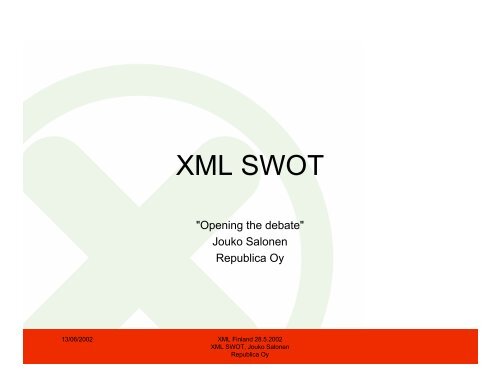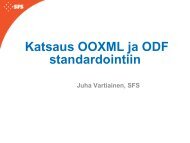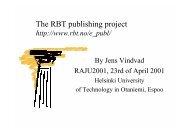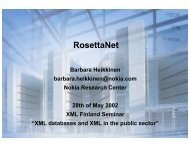XML SWOT - XML Finland
XML SWOT - XML Finland
XML SWOT - XML Finland
Create successful ePaper yourself
Turn your PDF publications into a flip-book with our unique Google optimized e-Paper software.
<strong>XML</strong> <strong>SWOT</strong><br />
"Opening the debate"<br />
Jouko Salonen<br />
Republica Oy<br />
13/06/2002 <strong>XML</strong> <strong>Finland</strong> 28.5.2002<br />
<strong>XML</strong> <strong>SWOT</strong>, Jouko Salonen<br />
Republica Oy
Motivation: to explicate the <strong>XML</strong>-related arguments in<br />
the Finnish citizen-centered e-government discourse<br />
• Sources:<br />
• Julkisten verkkopalvelujen kehittäminen ja <strong>XML</strong> (JUNA)<br />
http://www.intermin.fi/suom/juna/julkaisut/<br />
• GAO, Electronic Government, Challenges to Effective Adoption<br />
of the Extensible Markup Language (<strong>XML</strong>), April 2002 (United<br />
States General Accounting Office)<br />
• Federal Tag Standards for Extensible Markup Language (LMI)<br />
• DON <strong>XML</strong> Development Guidelines<br />
• Jon Bosak: Ritual <strong>XML</strong> Reminders<br />
• http://www.irs.gov<br />
• Owen Ambur; eXtensible markup language (<strong>XML</strong>): Greek,<br />
Esperanto,Panacea or Snake Oil<br />
http://users/erols.com/ambur/xml.htm<br />
• Susan Blackmore; The Meme Machine, Oxford University<br />
Press, 1999<br />
13/06/2002 <strong>XML</strong> <strong>Finland</strong> 28.5.2002<br />
<strong>XML</strong> <strong>SWOT</strong>, Jouko Salonen<br />
Republica Oy
Content<br />
• <strong>XML</strong>Reminders (slides 4-7)<br />
• <strong>XML</strong> <strong>SWOT</strong> (slide 8)<br />
• Strenght and Opportunity (slides 9,10)<br />
• Weaknesses and Threats (slide 11)<br />
• Distributed control of standardization (slides 12-14)<br />
• <strong>XML</strong> performance: What is good performance<br />
(slides 15-22)<br />
• Slides: http://www.republica.fi/xhtml/news.html<br />
13/06/2002 <strong>XML</strong> <strong>Finland</strong> 28.5.2002<br />
<strong>XML</strong> <strong>SWOT</strong>, Jouko Salonen<br />
Republica Oy
Reminder: <strong>XML</strong> is not*...<br />
• <strong>XML</strong> is not a language but a metalanguage<br />
– It is designed to support the definition of an unlimited<br />
number of languages for specific industries and applications<br />
• <strong>XML</strong> is not semantics, tags have no predefined<br />
meaning<br />
– <strong>XML</strong> by itself conveys only content and structure, not<br />
presentation,behavior or meaning<br />
– The meaning of <strong>XML</strong>-languages must be defined outside<br />
<strong>XML</strong>-standard itself<br />
– Application behaviour can be connected to <strong>XML</strong> after<br />
structure definition (late binding)<br />
13/06/2002 <strong>XML</strong> <strong>Finland</strong> 28.5.2002<br />
<strong>XML</strong> <strong>SWOT</strong>, Jouko Salonen<br />
Republica Oy<br />
*according to J.Bosak
Reminder: <strong>XML</strong> is*...<br />
• <strong>XML</strong> builds on 30 years of research and 16 years of<br />
standardization (ISO 8879, 1986)<br />
• <strong>XML</strong> is a framework for developing an unlimited<br />
number of special-purpose data languages<br />
• <strong>XML</strong> allows people sharing a common data exchange<br />
problem to develop an open solution to that problem;<br />
in principle that lets anyone with a similar problem<br />
use the same solution<br />
• without interference of third parties, without<br />
dependence of large software vendors<br />
13/06/2002 <strong>XML</strong> <strong>Finland</strong> 28.5.2002<br />
<strong>XML</strong> <strong>SWOT</strong>, Jouko Salonen<br />
Republica Oy<br />
*according to J.Bosak
<strong>XML</strong> is about collaboration*<br />
• <strong>XML</strong> provides a standard framework for<br />
making agreements about<br />
communication<br />
– Industry DTDs<br />
– Industry Schemas<br />
– Industry namespaces<br />
• But it does not make those agreements<br />
by itself!<br />
13/06/2002 <strong>XML</strong> <strong>Finland</strong> 28.5.2002<br />
<strong>XML</strong> <strong>SWOT</strong>, Jouko Salonen<br />
Republica Oy<br />
*according to J.Bosak
<strong>XML</strong> trade-off*<br />
• <strong>XML</strong> trades off<br />
– performance<br />
– Centralized control<br />
– Uniformity<br />
• in order to get<br />
– distributed control<br />
– asynchronicity<br />
– persistence (!)<br />
– a structure obvious both to humans and machines<br />
– a very low cost of entry<br />
13/06/2002 <strong>XML</strong> <strong>Finland</strong> 28.5.2002<br />
<strong>XML</strong> <strong>SWOT</strong>, Jouko Salonen<br />
Republica Oy<br />
*according to J.Bosak
<strong>XML</strong> <strong>SWOT</strong><br />
http://www.intermin.fi/suom/juna/julkaisut/<br />
• Strenghts<br />
– open standard, platform neutral, self-describing, promotes integration and<br />
co-operation, enables knowledge management<br />
• Weaknesses<br />
– dispersed uncontrolled vocabulary-work, uncertainty concerning the<br />
consortia-driven standard development, uncertainty due to the immaturity of<br />
sub-standards, products and tools not ready, solutions not reliable due to te<br />
lack of know-how and experience, poor performance due to the text-based,<br />
self-describing tags<br />
• Opportunity<br />
– common ground for information exchange, enables the usage of ole legacy<br />
data in multi channel services, releases from the vendor lock-in, enables<br />
information aggregation and composite services<br />
• Threats<br />
– no agreement of commonly accepted vocabularies, solutions do not support<br />
cooperation and re-usability, applications do not really support <strong>XML</strong>standard,<br />
standardization work becomes fragmented<br />
13/06/2002 <strong>XML</strong> <strong>Finland</strong> 28.5.2002<br />
<strong>XML</strong> <strong>SWOT</strong>, Jouko Salonen<br />
Republica Oy
Strenght and Opportunity<br />
• Promotes integration and co-operation<br />
• Common ground for information exchange<br />
• Enables the usage of old legacy data in multi channel services<br />
• Releases from the vendor lock-in<br />
• Enables information aggregation and composite services<br />
• Remember <strong>XML</strong> trade-off! (Slide 7)<br />
• Quotes: Julkisten verkkopalvelujen kehittäminen ja <strong>XML</strong> (JUNA)<br />
http://www.intermin.fi/suom/juna/julkaisut/<br />
13/06/2002 <strong>XML</strong> <strong>Finland</strong> 28.5.2002<br />
<strong>XML</strong> <strong>SWOT</strong>, Jouko Salonen<br />
Republica Oy
Strenght & Opportunity<br />
What would it mean if one could process 10X more drivers licence,<br />
passport or visa requests or tax-forms per day<br />
Very high short<br />
term ROI!<br />
Automate<br />
Integrate<br />
Harvest & Analyse<br />
Aggregate<br />
Long and mid-term term<br />
ROI due to easier<br />
management and reconfiguration<br />
and some<br />
intangible values<br />
Connect<br />
Request<br />
for a drivers<br />
licence<br />
or<br />
passport<br />
Portal<br />
Tax records<br />
Criminal records<br />
Traffic violations<br />
<strong>XML</strong><br />
Bad credit<br />
B2B<br />
<strong>XML</strong> broker<br />
Baltic &<br />
Nordic COOP<br />
COOP with<br />
other EU-countries<br />
Address- and<br />
other contact<br />
information<br />
13/06/2002 <strong>XML</strong> <strong>Finland</strong> 28.5.2002<br />
<strong>XML</strong> <strong>SWOT</strong>, Jouko Salonen<br />
Republica Oy
Weaknesses and Threats<br />
• Dispersed uncontrolled vocabulary-work<br />
• Uncertainty concerning the consortia-driven standard<br />
development<br />
• Uncertainty due to the immaturity of sub-standards<br />
• Standardization work becomes fragmented<br />
• No agreement of commonly accepted vocabularies<br />
• Solutions do not support cooperation and re-usability<br />
• Products and tools not ready<br />
• Applications do not really support <strong>XML</strong>-standard<br />
• Poor performance<br />
• Security issues (NOT IN JUNA-REPORT!)<br />
13/06/2002 <strong>XML</strong> <strong>Finland</strong> 28.5.2002<br />
<strong>XML</strong> <strong>SWOT</strong>, Jouko Salonen<br />
Republica Oy
Weaknesses and Threats 1.<br />
• Dispersed uncontrolled vocabulary-work<br />
• Uncertainty concerning the consortia-driven standard<br />
development<br />
• Uncertainty due to the immaturity of sub-standards<br />
• Standardization work becomes fragmented<br />
• No agreement of commonly accepted vocabularies<br />
13/06/2002 <strong>XML</strong> <strong>Finland</strong> 28.5.2002<br />
<strong>XML</strong> <strong>SWOT</strong>, Jouko Salonen<br />
Republica Oy
489 times "Date": No return to centralized<br />
uniformity<br />
• General Service Administration (USA)<br />
and Logistics Management Institute<br />
reviewed different <strong>XML</strong> tag dictionaries to<br />
determine if the federal government can<br />
adobt a single standard for establishing<br />
<strong>XML</strong> tags<br />
– Commerce One xCBL<br />
– eb<strong>XML</strong><br />
– Oasis<br />
– RosettaNet<br />
• Together more than 8400 separate name<br />
entities<br />
• 489 different expressions for "DATE"<br />
• Remember: More than 400.000<br />
developers are using <strong>XML</strong>SPY, a leading<br />
<strong>XML</strong> Schema development tool<br />
Category Number of entries<br />
Name 357<br />
Date 489<br />
Time 160<br />
Address 41<br />
Agency 12<br />
Contact 206<br />
Telephone 56<br />
Amount 172<br />
Quantity 186<br />
13/06/2002 <strong>XML</strong> <strong>Finland</strong> 28.5.2002<br />
<strong>XML</strong> <strong>SWOT</strong>, Jouko Salonen<br />
Republica Oy
Fragmented <strong>XML</strong>Schema work - IRSForm1120<br />
149 Schemas!<br />
<br />
<br />
<br />
<br />
<br />
<br />
<br />
<br />
<br />
<br />
<br />
<br />
<br />
<br />
<br />
<br />
<br />
<br />
<br />
<br />
<br />
•Remember: More than 400.000 developers are using <strong>XML</strong>SPY, a leading <strong>XML</strong> Schema development tool<br />
13/06/2002 <strong>XML</strong> <strong>Finland</strong> 28.5.2002<br />
<strong>XML</strong> <strong>SWOT</strong>, Jouko Salonen<br />
Republica Oy
The truth is: heteroglossia will prevail<br />
• No universal set of TAG-design<br />
rules exists<br />
• The corporate consortias do not<br />
coordinate with design rules<br />
• However, eb<strong>XML</strong> chose<br />
DeliveryScheduledDate (see<br />
right column!) because of<br />
ISO11179-5*<br />
• ISO11179-5<br />
– Syntactic rules (like "there must<br />
be at least one object class and<br />
one property term")<br />
– Semantic rules (like "Oxford<br />
English Dictionary spellings<br />
must be used")<br />
• ScheduledDeliveryDate<br />
(RosettaNet)<br />
• EarliestDeliveryDate<br />
(CommerceOne)<br />
• ScheduledShipdate(Oasis)<br />
• DeliveryScheduledDate<br />
(eb<strong>XML</strong>)<br />
• DateDeliveryScheduled<br />
*ISO11179-5: Information Technology Specification and Standardization of Data Elements, Part 5<br />
Naming and Identification Principles for Data Elements<br />
13/06/2002 <strong>XML</strong> <strong>Finland</strong> 28.5.2002<br />
<strong>XML</strong> <strong>SWOT</strong>, Jouko Salonen<br />
Republica Oy
Guidelines and recommendations:<br />
fragmented vocabulary-work<br />
• The eb<strong>XML</strong> suite of technical<br />
specifications and related joint<br />
UN/EDIFACT work represent<br />
the only neutral, horizontalbased,<br />
accredited <strong>XML</strong><br />
business standards<br />
development effort and<br />
appears, thus, to hold the most<br />
promise<br />
• ISO11179 offers a sound basis<br />
• tag-name limited to 4-6 words, a<br />
total of 30 letters<br />
• No acronyms or abbreviations<br />
• Initial capital letters<br />
• English dictionary spellings<br />
13/06/2002 <strong>XML</strong> <strong>Finland</strong> 28.5.2002<br />
<strong>XML</strong> <strong>SWOT</strong>, Jouko Salonen<br />
Republica Oy<br />
• Establish a consistent process,<br />
use vertical guidelines<br />
• Establish registry /repository/<br />
data element dictionaries<br />
• Use "translator's approach"<br />
instead of "dictator's"<br />
• Do not forget, that this is an<br />
evolutionary,memetic process,<br />
where we have the role of being<br />
a part of the evolutionary<br />
choice-making-machine.<br />
• Within an evolution, there is no<br />
"wait outside and see" mode.<br />
The train is moving, you are<br />
there, your choices are: steer<br />
yourself or let others do that!
Application oriented<br />
Weaknesses and Threats<br />
• Solutions do not support cooperation and re-usability<br />
• Products and tools not ready<br />
• Applications do not really support <strong>XML</strong>-standard<br />
• Poor performance<br />
• Security issues (NOT IN JUNA-REPORT!)<br />
13/06/2002 <strong>XML</strong> <strong>Finland</strong> 28.5.2002<br />
<strong>XML</strong> <strong>SWOT</strong>, Jouko Salonen<br />
Republica Oy
Application oriented<br />
Weaknesses and Threats<br />
• Products and tools not ready<br />
• Applications do not really support <strong>XML</strong>-standard<br />
• Check "DON <strong>XML</strong> Development Guidelines" 12/2001<br />
slide 12<br />
• W3C, Oasis offer validating tools for checking the<br />
standard conformance<br />
13/06/2002 <strong>XML</strong> <strong>Finland</strong> 28.5.2002<br />
<strong>XML</strong> <strong>SWOT</strong>, Jouko Salonen<br />
Republica Oy
Performance issue<br />
• <strong>XML</strong> Query (Person<br />
database)<br />
– Searching persons with<br />
certain occupation, age<br />
and gender<br />
– Flat, structured, list-type<br />
input material enables<br />
linear query execution time<br />
– <strong>XML</strong> database (e.g.<br />
Software AG Tamino)<br />
enables logarithmic query<br />
execution time<br />
13/06/2002 <strong>XML</strong> <strong>Finland</strong> 28.5.2002<br />
<strong>XML</strong> <strong>SWOT</strong>, Jouko Salonen<br />
Republica Oy
<strong>XML</strong> query performance<br />
<strong>XML</strong> Queries<br />
800<br />
250<br />
Memory consumption<br />
(kilobytes)<br />
700<br />
600<br />
500<br />
400<br />
300<br />
200<br />
100<br />
200<br />
150<br />
100<br />
50<br />
Time (seconds)<br />
Memory<br />
Time<br />
0<br />
5 9 14 18 23 27 32 36 41 45<br />
0<br />
Filesize (megabytes)<br />
13/06/2002 <strong>XML</strong> <strong>Finland</strong> 28.5.2002<br />
<strong>XML</strong> <strong>SWOT</strong>, Jouko Salonen<br />
Republica Oy
Performance issue: conversions<br />
• Highly structured, documentlike<br />
input material<br />
• Conversion <strong>XML</strong>/HTML<br />
• Streaming mode, memory<br />
consumption stays on a<br />
constant level<br />
• Time curve is linear: When<br />
input size is doubled,<br />
conversion time is doubled<br />
13/06/2002 <strong>XML</strong> <strong>Finland</strong> 28.5.2002<br />
<strong>XML</strong> <strong>SWOT</strong>, Jouko Salonen<br />
Republica Oy
Performance issue: conversions<br />
<strong>XML</strong> Conversion (documents)<br />
1600<br />
400<br />
Memory Consumption<br />
(kilobytes)<br />
1400<br />
1200<br />
1000<br />
800<br />
600<br />
400<br />
200<br />
350<br />
300<br />
250<br />
200<br />
150<br />
100<br />
50<br />
Time (seconds)<br />
Memory<br />
Time<br />
0<br />
5 9 14 18 23 28 32 37 42 46<br />
0<br />
Filesize (megabytes)<br />
13/06/2002 <strong>XML</strong> <strong>Finland</strong> 28.5.2002<br />
<strong>XML</strong> <strong>SWOT</strong>, Jouko Salonen<br />
Republica Oy
Performance issue: <strong>XML</strong> Generation and<br />
Serialization (invoices)<br />
• <strong>XML</strong> Generation and<br />
Serialization (invoices)<br />
• Generating <strong>XML</strong><br />
invoices using random<br />
values<br />
• Average structured<br />
<strong>XML</strong> material<br />
• Serializing invoices to<br />
hard drive<br />
13/06/2002 <strong>XML</strong> <strong>Finland</strong> 28.5.2002<br />
<strong>XML</strong> <strong>SWOT</strong>, Jouko Salonen<br />
Republica Oy
Performance issue: <strong>XML</strong> Generation and<br />
Serialization (invoices)<br />
<strong>XML</strong> Generation (invoices)<br />
700<br />
140<br />
Memory consuption<br />
(kilobytes)<br />
600<br />
500<br />
400<br />
300<br />
200<br />
100<br />
120<br />
100<br />
80<br />
60<br />
40<br />
20<br />
Time (seconds)<br />
Memory<br />
Time<br />
0<br />
24 48 72 96 120<br />
Filesize (megabytes)<br />
0<br />
13/06/2002 <strong>XML</strong> <strong>Finland</strong> 28.5.2002<br />
<strong>XML</strong> <strong>SWOT</strong>, Jouko Salonen<br />
Republica Oy
Performance issue: Complex <strong>XML</strong> Lay-Out<br />
conversion into human readable form<br />
• Complex <strong>XML</strong> Lay-<br />
Out Conversion<br />
(invoices)<br />
• Converting the<br />
invoices generated<br />
at previous case into<br />
human-readable<br />
form<br />
Memory consumption<br />
(kilobytes)<br />
800<br />
700<br />
600<br />
500<br />
400<br />
300<br />
200<br />
100<br />
0<br />
<strong>XML</strong> Conversion (invoices)<br />
24 48 72 96 120<br />
Filesize (megabytes)<br />
500<br />
450<br />
400<br />
350<br />
300<br />
250<br />
200<br />
150<br />
100<br />
50<br />
0<br />
Time (seconds)<br />
Memory<br />
Time<br />
13/06/2002 <strong>XML</strong> <strong>Finland</strong> 28.5.2002<br />
<strong>XML</strong> <strong>SWOT</strong>, Jouko Salonen<br />
Republica Oy
Performance issue: Complex <strong>XML</strong> Lay-Out<br />
conversion into human readable form<br />
13/06/2002 <strong>XML</strong> <strong>Finland</strong> 28.5.2002<br />
<strong>XML</strong> <strong>SWOT</strong>, Jouko Salonen<br />
Republica Oy
Guidelines and recommendations:<br />
performance issue<br />
• <strong>XML</strong> performance is really a<br />
practical trade-off issue.<br />
Self-describing natural<br />
language like tag-format<br />
brings you more than you<br />
really loose in terms of<br />
performance<br />
• As the above examples<br />
show, in terms of<br />
performance, <strong>XML</strong> is fully<br />
scalable data format<br />
• You get:<br />
– no vendor lock in<br />
– open standard component<br />
architecture with self-describing,<br />
open interfaces<br />
– re-usable solution that you can<br />
circulate<br />
• Jon Bosak (Sun Microsystems):<br />
"<strong>XML</strong> allows people sharing a<br />
common data exchange problem, to<br />
work out an open solution to that<br />
problem. Without interference of<br />
third parties, without dependence<br />
on large software vendors."<br />
13/06/2002 <strong>XML</strong> <strong>Finland</strong> 28.5.2002<br />
<strong>XML</strong> <strong>SWOT</strong>, Jouko Salonen<br />
Republica Oy
Are there <strong>XML</strong>-standard related<br />
security issues<br />
• Security is not a separate issue!<br />
• "Element crypting"<br />
• DRM - "Digital Rights Management"<br />
13/06/2002 <strong>XML</strong> <strong>Finland</strong> 28.5.2002<br />
<strong>XML</strong> <strong>SWOT</strong>, Jouko Salonen<br />
Republica Oy







